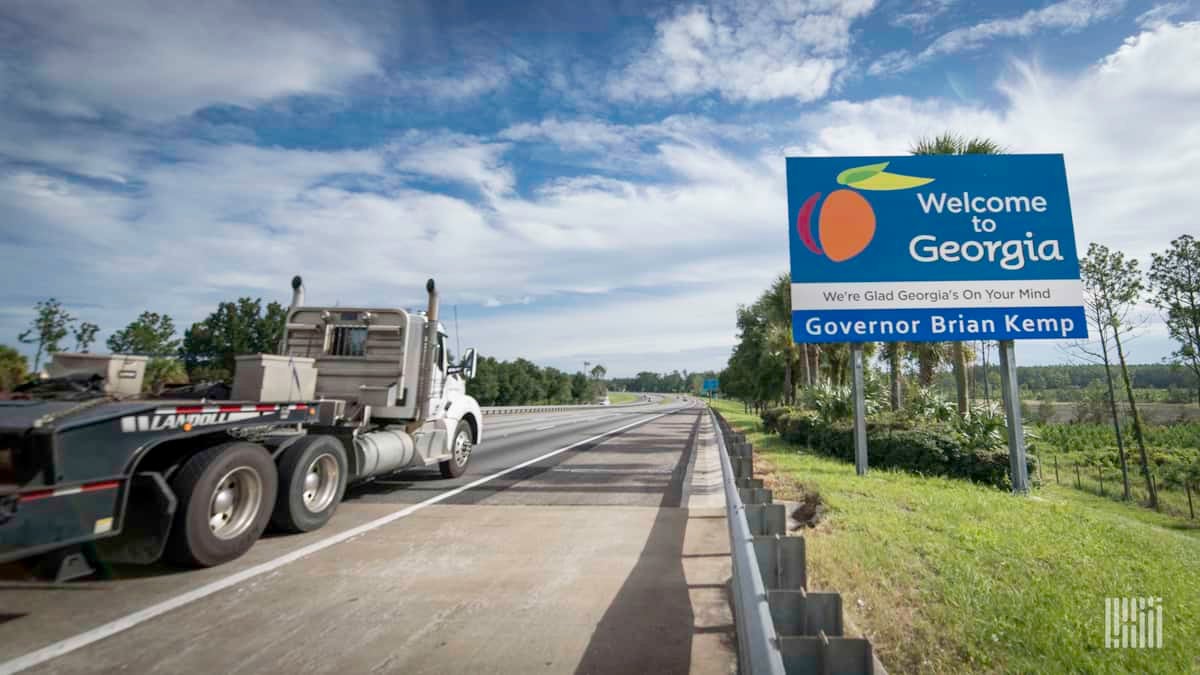The Georgia Motor Trucking Association (GMTA) did something last month that few organizations have attempted since March: It met in person.

Gathering at the Ritz Carlton in Amelia Island, Florida, about 300 people came for the group’s annual meeting. That’s down from a usual number that might hit 600 but it’s a lot more than zero, which has been the norm across all sectors since the pandemic first took hold in March.
And according to Ed Crowell, the president and CEO of the GMTA, the number of COVID-19 cases reported back to the organization from the June 19-22 meeting remains at zero. Given that the COVID-19 virus has a two-week incubation period, it’s likely the number will stay there.
But that doesn’t mean holding the meeting was a breeze. In an interview with FreightWaves, Crowell said the organization began working with the Ritz Carlton in February on how the GMTA could pull off a socially distanced meeting.
“In some respects it wasn’t easy,” Crowell said. “But it’s helped to have good data to help make the choice.”
According to a summary of the meeting sent by the GMTA to other associations, an April survey of members indicated 90%-plus support for an in-person meeting. The association’s management engaged in discussions with its insurers and consulted what it said were “predictive sites for their forecast of COVID-19 spread.”
Crowell noted that the GMTA had worked with the Amelia Island Ritz Carlton many times in the past, so “they knew us and we knew them. We could trust them.”
Safety was the overriding goal but the meeting needed to be engaging enough to avoid “nobody doing anything except sitting in their room the whole weekend.”
Although Florida is a COVID-19 hot spot, Crowell said the Jacksonville area where the meeting took place is not one of the cities hardest hit.
One significant change by the hotel was that it waived all minimums. At such events, there is a minimum for the block of rooms put aside for the convention and for food and beverage charges. With the hotel waiving those for the GMTA meeting, Crowell said the costs of the meeting all became variable, fluctuating with such things as the number of meals actually served or the rooms actually sold. .
The steps taken by the hotel were significant, Crowell said. Personal protective equipment was supplied; Plexiglas barriers were set up; the staff all wore masks; and automatic doors were installed to eliminate the need to grab a handle.
But Crowell conceded that the meeting got a special degree of attention that not everybody else can. “We benefited from the fact that nobody else was going forward and it freed up the hotel,” he said. The absence of other events at the hotel allowed the hotel’s main ballroom to be set up for the meeting, with everybody spaced 6 feet apart during the business sessions.
Other steps: Paper was out. A family-oriented opening reception included events such as laser skeet shooting with the gun wiped down after each user. And the annual directors meeting was held via Zoom before the Amelia Island meeting.
“It was a strange-looking meeting,” Crowell acknowledged. But he said it followed CDC guidelines.
Also, buffets were out; all meals came on plates. Fewer people were at each table than normal, though a family could sit at a table with higher numbers than individual attendees. Crowell said a few events that might normally take place, like pre-dinner receptions, were canceled.

In the summary of the meeting the GMTA sent to other state associations, as well as the American Trucking Associations (ATA), the gathering was declared “by all accounts a success and met with rave reviews from attendees and hotel staff.”
The numbers, however, did tell a story of some degree of avoidance: Attendance of 298 compared to 541 a year before. But Crowell said a lot of the attendance drop was because of company policy of no travel or limited travel, more so than fear of the virus.
Sponsorships were down “a bit,” Crowell said in his summary memo. The GMTA meeting did not have an exhibition hall in previous shows so nothing was lost there. “All nonparticipating sponsors made verbal commitments to return in the future,” Crowell wrote. “Most cited company-imposed financial restraints as their only reason for lack of participation.”
The variable cost structure did allow the meeting to “produce a margin.” There were guarantees rather than minimums, but the association was able to predict things like meal consumption with 98% accuracy.
While meeting cancellations have been rolling through the trucking sector since March, the ATA has said repeatedly it plans on holding its annual meeting in Denver as an in-person event Oct. 20-24. It has posted a list of safety precautions it plans to take.
Crowell said though ATA Chairman Randy Guillot was a speaker at the GMTA event, the ATA was not part of the planning process.
“I won’t claim to be a trailblazer but I haven’t heard of anybody else doing this,” Crowell said. “So we were either geniuses or fools going where angels fear to tread.”
More articles by John Kingston
Louisiana legislature passes tort reform; governor’s approval expected
Drilling Deep: Dealing with now but getting ready for a post-COVID world











